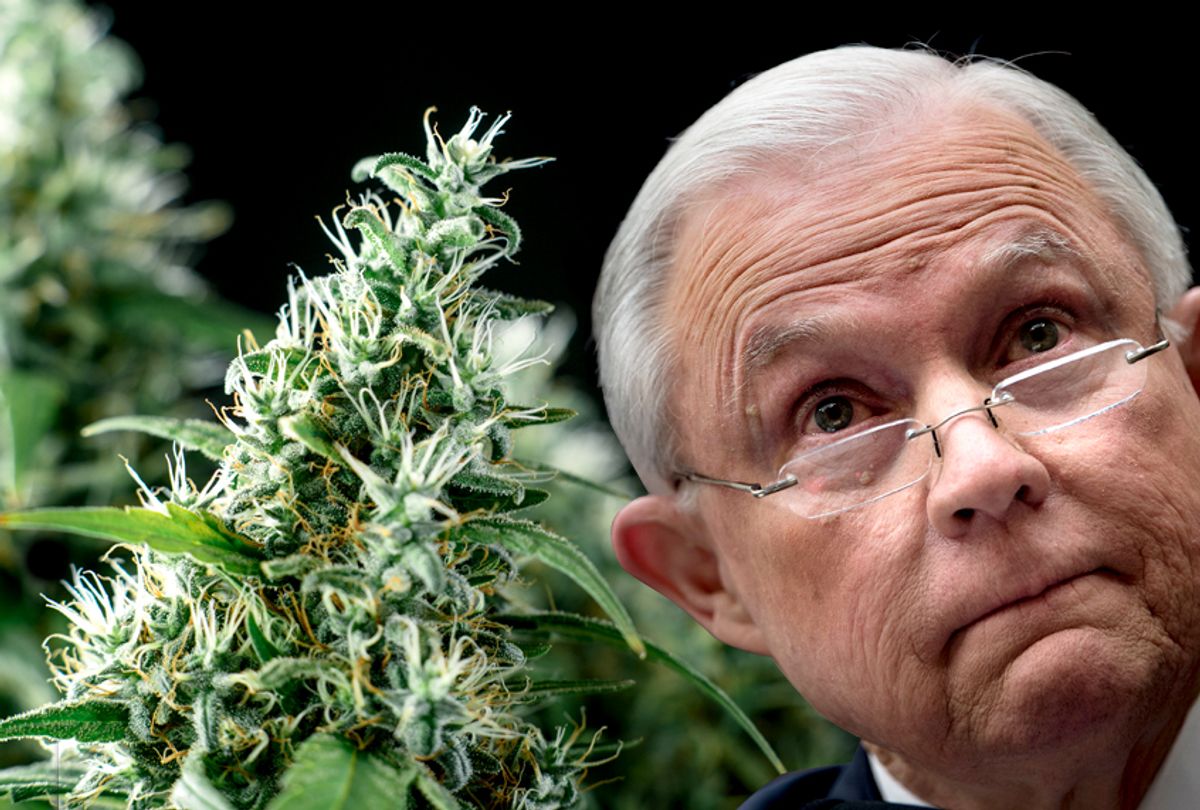"I think this would be a good time for a beer."
-- President Franklin D. Roosevelt, after signing the Beer-Wine Revenue Act of 1933, a first step toward repealing the larger prohibition on alcohol
What a difference a day makes.
Last Wednesday, Jan. 3, I interviewed a marijuana policy expert on the future of the legalization movement in America. California had just begun selling recreational marijuana for the first time in its history. Vermont was moving toward a quick vote on legalization. And Attorney General Jeff "Good People Don't Smoke Marijuana" Sessions had so far done little more than bloviate about clamping down on legal cannabis. All told, six states had already legalized recreational marijuana use, two others had passed laws that had not yet taken effect and 29 others, plus the District of Columbia, had legalized it for medical purposes. My interview had been, if not hopeful, then at least cautiously optimistic.
By the next day, that cautious optimism had been shattered. In its wake is the hope that the Democratic Party will overcome its jitters around this issue and take a principled -- not to mention politically potent -- stand.
As followers of the marijuana legalization issue already know, Sessions announced on Thursday that he was rescinding the Cole Memo, a policy drafted by Deputy Attorney General James M. Cole under President Barack Obama. Under its terms, states that had legalized marijuana could proceed without federal interference so long as they followed certain guidelines: keeping the drug out of the hands of children, trying to keep it out of other states where it remained prohibited and so on. Instead, Sessions will allow federal prosecutors in states where marijuana has been legalized to decide for themselves whether they will honor the wishes of the citizens of those states.
This bleak outlook had not yet emerged on when I spoke with Justin Strekal, the political director for the National Organization of the Reform of Marijuana Laws, or NORML. After describing the complicated legislative process that has so far kept the Justice Department "from spending any federal resources whatsoever, not one agent, not one paper clip, to go after state lawful medical marijuana programs," Strekal discussed other methods that Sessions could use to attack marijuana legalization — including rescinding the Cole Memo.
"Just a couple of weeks ago, the Attorney General and the DOJ went through and purged a number of Obama-era guidance memos," he said. "The Cole Memo was not among them." Although Sessions had continued his "lifelong anti-marijuana rhetoric as attorney general," Strekal continued, "his actions so far have been just talk."
Clearly Sessions is no longer just talking — and as soon as he announced that he was rescinding the Cole Memo, NORML sent out a press release denouncing the decision.
"By rescinding the Cole Memo, Jeff Sessions is acting on his warped desire to return America to the failed beliefs of the 'Just Say No' and Reefer Madness eras," declared NORML executive director Erik Altieri. "This action flies in the face of sensible public policy and broad public opinion. The American people overwhelmingly support the legalization of marijuana and oppose federal intervention in state marijuana laws by an even wider margin."
Altieri is incontrovertibly correct about public opinion. As of October, a whopping 64 percent of Americans supported legalizing marijuana, continuing a steady increase that began back in 2012. Yet as with the movement to legalize same-sex marriage — one in which the people came around to the idea much more quickly than elected officials, although a handful of states moved in the right direction — politicians have been remarkably slow when it comes to supporting marijuana legalization.
"For years, almost the only voices were Democrats in support of reform," Strekal told Salon. "Now we're seeing the majority of the party on board. ... But it's also a level of engagement. It's not necessarily Democratic elected officials’ first priority to address marijuana reform."
Perhaps Sessions' recent policy decision will have as radical an impact on the Democratic Party's priorities as it did on the shape of this article. There were already early signs that mainstream Democratic politicians were planning on making marijuana legalization into a major issue — Sen. Cory Booker of New Jersey, a likely Democratic presidential candidate, came out in favor of legalization last year. Other potential 2020 contenders have taken stands of varying boldness on the issue as well, including Sens. Bernie Sanders of Vermont, Kirsten Gillibrand of New York and Elizabeth Warren of Massachusetts.
These are all important steps forward, but they won't suffice unless the Democratic base pressures its political leaders into staying the course. As experts have pointed out time and time again, there is virtually no argument to be made against marijuana that couldn't also be made against alcohol. Alcohol is far more likely to kill you than marijuana. It is more likely to impair your judgment to the point that you commit violent crimes. Its deleterious effects on your health are almost certainly worse.
Of course, alcohol was illegal in the United States during the period known as the Prohibition era, from 192o to 1933. It wasn't until President Franklin D. Roosevelt took office that the Prohibition was rescinded, in large part because politicians realized that the people demanded repeal and common sense couldn't justify enforcement. Yet even there Roosevelt initially took baby steps — such as a law that legalized certain types of beer and wine before allowing harder spirits — and had to be compelled toward bolder action by pressure from those who favored personal freedom.
This is a winning issue for Democrats, and also a chance to embrace the concept of "liberty" too often co-opted by conservatives. Let us hope that the Democrats of 2020 have the spine to reject Sessions' backward-looking policy and end the great prohibition of our time.



Shares